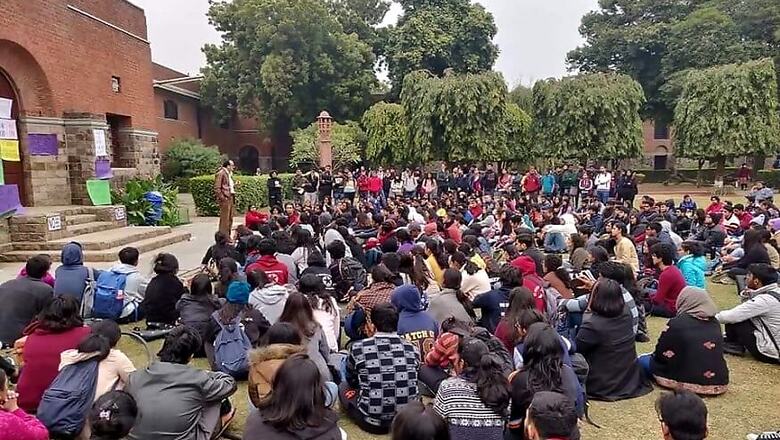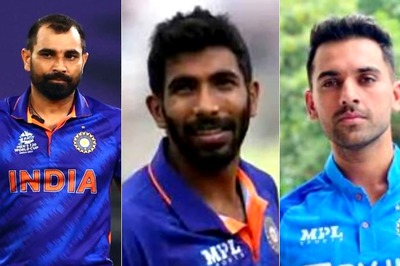
views
Although our alma mater St. Stephen’s College rarely captured our imagination after we passed out in 1995 and 2005, something peculiar that happened in the last three days at the college has got our conscience facing some disturbing questions.
The said developments were raising of Azadi slogans and “free Kashmir” slogans. Interestingly, in Kashmir, as veteran journalist Majid Hydari puts it, the ‘azadi’ narrative has become a thing of the past after the August 5 decision of the BJP government.
However, St. Stephen’s College students chose to display a banner asking for freeing Kashmir, as if Pakistan and its proxies were not doing a good job.
St. Stephen’s College, as we have known and been introduced to, is a college with a past that matters to this country’s moral and intellectual consciousness. It is a college where Mahatma Gandhi and CF Andrews prepared the strategy for the Khilafat movement.
It is a college where Mahatma Gandhi, Andrews and Rabindranath Tagore had long extensive discussions on the freedom movement. Lala Hardayal, the famous Gadar revolutionary, was from St. Stephen’s College. Also, the college has produced a long list of eminent writers, social activists, corporate honchos, bureaucrats, diplomats, and politicians across the spectrum, all of whom have made immense contribution is making India a great nation.
When the students of such an institute with a great legacy raise slogans calling for the disintegration of the country is undoubtedly a worrisome development for various reasons.
Having said about the glorious history of the college, we would also like to share some of our observations about St. Stephen’s College that may not go down well with the Stephanian fraternity.
However, it is quite essential to know the other side of St. Stephen’s College to understand the background of what we are witnessing today in the college.
As mentioned above, the college has produced some of the brightest and most successful minds of this country.
The illustrious list includes Shashi Tharoor, Amitav Ghosh, Upmanyu Chatterjee, Subrahmanyam Jaishankar, Arun Shourie, Sucheta Kriplani, Mukul Kesavan, and Ranjan Gogoi. However, St. Stephen’s has produced General Zia ul Haq, the father of ‘South Asian Jihadism’ and terrorism and the original mastermind of “bleeding India through 1,000 cuts theory”. He pushed Pakistan into the hell-hole of jihadism.
Congress’ Digvijaya Singh is also from St. Stephen’s College. As the secretary-general of the then ruling Congress party, Singh had shared the stage with global terrorist Zakir Naik facing Interpol’s red corner notice. Also, when he did, Zakir was using the choicest of abuses for Hindu gods and goddesses for a long time.
After the Mumbai terror attack in November 2008, Singh had inaugurated a book titled, “26/11- RSS ki Sazish”, clearly indicating his thoughts about the people responsible for the carnage.
His party, which had 21 MPs from St. Stephen’s college, has also peddled the fake narrative of Hindu terrorism. When all this was happening, the most enlightened and liberated souls of St. Stephen’s did not raise a word against it.
The college has carried a veneer of elitism, snobbery, and feudal instincts. For Stephanians, the phrase that brings a smirk with pride is, “the college across the road,” a phrase reserved for the Hindu college.
At St. Stephen’s, we saw that English, economics, history honors’ students looked down upon their mates pursuing pass courses and Sanskrit honors.
Students felt ashamed of speaking in Hindi. Most of the students are still obsessed with the power of bureaucracy — Shashi Tharoor’s vocabulary and looks, and Mani Shankar Aiyar’s accent.
Watching Hollywood cinema, listening to punk rock music, pseudo-Marxism, armchair, and cliched activism, smoking weed, and abusing BJP/RSS made you look trendy and cool.
Also, it brought you more status and pretty girlfriends. Two Muslim classmates of one of the authors of this piece, supported Osama Bin Laden in India’s bastion of liberal democracy when the twin towers were busted. At St. Stephen’s College, some professors taught with divine worship that Aurangzeb was a secular ruler.
Not only they found the idea the quintessence of certifying one’s secular credentials, but they also found any attempt to question that narrative a significant threat to India’s liberal democracy from knickerwallah sanghi fascists.
Well, it is also pertinent to mention that the faculty members taught from 20 years old notes prepared during the 1970s. We remember once Ram Madhav, D Raja, Praveen Togadia, and Sibal had come for a lecture.
Among the young intellectuals, the mere presence of Togadia and Ram Madhav was a death of India’s secularism. However, they never bothered to question the 50 percent Christian of St. Stephen’s college as an insult to India’s secularism.
John Dayal, as we remember, was very active in the college management board. He had given testimony against India at USCRIF on the question of religious freedom in India. However, no one ever bothered to question his acts and views.
Interestingly, the alumni of St. Stephen’s college has always projected the college as the mecca of pluralism, democracy, and diversity in India. On the contrary, the St. Stephen’s management has always been extraordinarily conscious of the Christian nature of the institutions, and they have also been blatant in projecting it.
The college had a Christian quota, but a few years back, as a result of a favorable SC judgment, the quota rose to 50 percent of the total seats. Though no one asked us to convert, and as far as the student culture was concerned, pluralism was shown a high order of respect; the decision carried a subtle message encouraging conversions to Christianity. However, we never witnessed the slogans of azadi against it.
Also, as a result of such an environment, there was an inherent bias and an attitude of denigration towards Hindutva organizations, Hindu spiritual masters, and political parties like BJP.
Though we have no links with any of the Hindutva-based political parties, we believe that in a democratic country, every opinion needs to be treated with respect and must have the freedom to project itself peacefully. Unfortunately, at St. Stephen’s, the majority understanding of Sanatan traditions and Hindu dharma was clichéd and lacked depth.
The problem is not just about St. Stephen’s college or JNU. The fact of the matter is- what are the protests all about? The students who are blindly opposing the CAA and abrogation of article 370 and buying borrowed narratives of the idea of India being under threat, hardly seem to reflect and understand the nuances of the issues critically.
The Stephanians who raised the banner of “free Kashmir” and the teachers who blessed them for this seem frightfully unaware of the jihadi extremist threats and Pakistan proxy war that India faces in Kashmir.
Unfortunately, the moment is not an occasion for celebrating that India’s elitist St. Stephen’s college has also jumped into the fray, but rather to mourn over the fact that our education system has failed us.
Maybe tomorrow, some other bright students from other premier institutions of India will start demanding Azadi, freedom of North East, Tamil Nadu, and Punjab.
Perhaps, they will be hailed as heroes and crusaders against Modi-Shah’s Hindutva by India’s public intellectuals and scholars. However, such a generation can not guarantee a safe future for any country.
Dissent and the right to dissent deserve the utmost respect and constitutional protection. However, the quality of the intellectual narrative of the protests also merits scrutiny if we want a “strong” democratic India, a “strong” secular India, and “strong” inclusive India.
And, we certainly want a “strong India” because no democracy and no secularism can function in the face of existential threats. The quality of the narrative of the ongoing student protest has been atrociously disappointing, and by all standards, it appears that we have failed to imbibe critical and original thinking in our young generation.
Indeed, India’s future stands at grave risk with this generation and their ‘azadi” slogans.
(Sanjay Kumar is an activist working in the field of conflict resolution. Abhinav Pandya is a graduate in Public Affairs from Cornell University. Views Expressed are personal)















Comments
0 comment